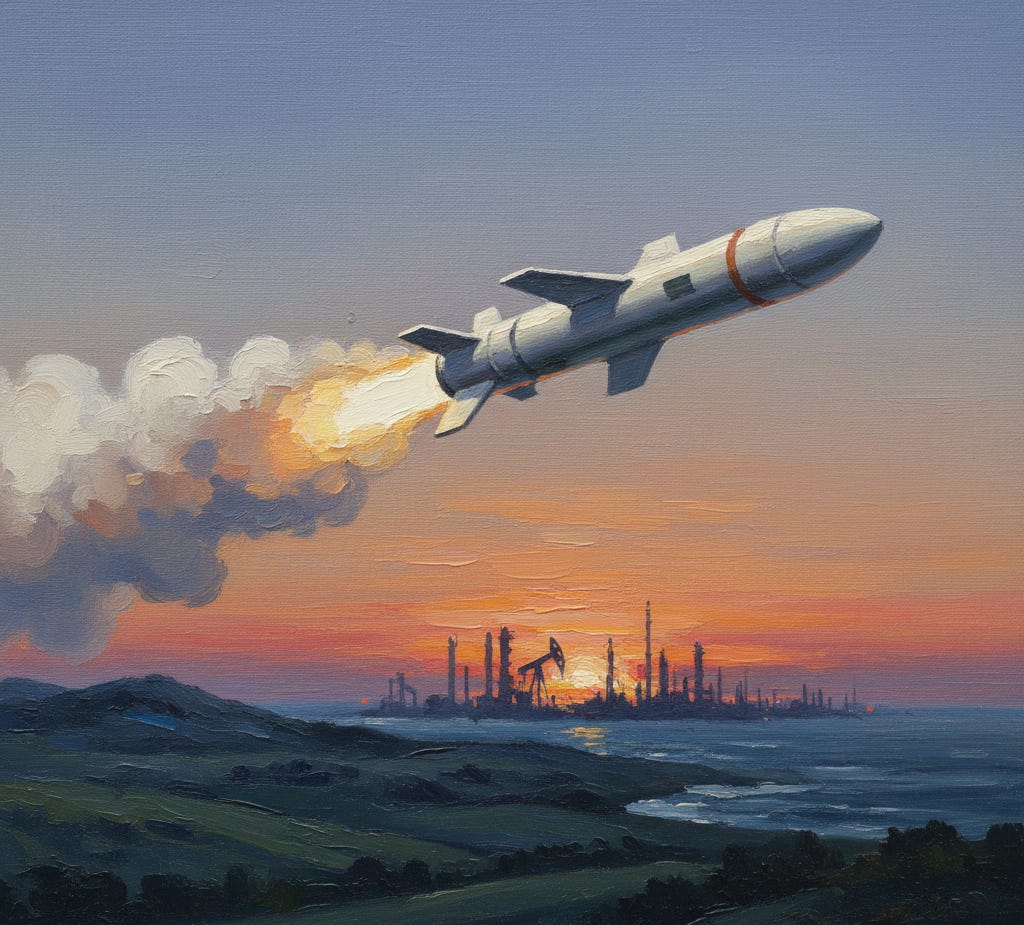Tomahawk Chop
Ukraine
It had been asleep for a long time.
Beneath the stale air of a shuttered museum, behind glass dulled by fingerprints that would never be wiped away, the Tomahawk lay among artifacts too old to stir emotion. A sign beside it read Tribal Warfare, 18th Century. The light above it flickered once, then died.
The rest of the building had gone dark days earlier when the government gridlocked and the power budget thinned to silence. Outside, Washington’s monuments stood pale in the winter fog. Inside, the air hung heavy with the faint scent of age and blood.
In that quiet, the Tomahawk began to awaken.
A tremor passed along its handle. The oak was cracked, the metal chipped, but beneath the wear something ancient stirred—a memory of pulse and heat, of hands that trembled before striking. Its edge caught what little light remained and reflected it like a dying star.
It rose, softly, as if exhaling after a long dream. The glass of its case did not break; it simply no longer mattered. The weapon floated past the mannequins and display lights, each shadow bowing as it passed. It slipped through the locked doors and into the thin night.
Far to the east, the air carried the scent of cordite and frost. The Tomahawk turned toward it.
It crossed oceans without sound. Clouds rolled beneath it in dark folds. Below, shadowy freighters moved like slow thoughts through the Atlantic, and satellites blinked from the black above.
When it reached the steppe, dawn was rising—a thin line of red through a pale sky. The Tomahawk hovered above a road churned to mud by motorbike treads. Drones buzzed like metal hornets, their propellers slicing the air with a high, thin whine.
A family was running down that road. A man clutching a boy, his breath ragged in the cold; a woman stumbling behind, her coat torn, her boots soaked through. A drone followed them, low and deliberate, camera locked, rotors whining as it descended.
The Tomahawk drifted closer.
It saw the fiber optic lines that carried the drone’s signal—spidery cables strung along the roadside, pulsing faintly with data. Its blade, still dull but hungry, brushed against one. The wire parted with a soft sigh.
The drone spasmed midair, jerked sideways, and tumbled into the dirt. Its rotors sputtered, then stilled. The sudden quiet was almost holy.
The family froze. The boy whimpered. The father turned, scanning the sky.
“Was it jammed?” he asked, his voice cracked from shouting.
The woman didn’t answer. She was staring upward, eyes wide, following something invisible that moved through the dawn.
A faint shimmer hung in the air, like the curve of heat above a fire. For a second, the man thought he saw an outline—a small axe, ancient in shape, gleaming like light on water. Then it was gone.
“Come on,” he said, gripping her arm. “We have to move.”
They kept running until the road bent out of sight.
The Tomahawk hovered for a moment longer, listening. The wind carried the sound of distant artillery—deep, rhythmic, almost like breathing. It turned north.
The land below grew colder, the snow more constant. Fields gave way to forests, then to the metallic sprawl of refineries. Pipes crisscrossed the tundra like veins. Flares burned in the distance, staining the sky with rust-colored light.
The Tomahawk remembered none of these machines, but it knew their purpose. It had known it since the first strike that drew blood. Every age gave war new hands, new tools, new names—but the motion was the same. Lift. Swing. Divide.
It rose higher, the wind thinning around it. From here, the Earth looked soft, almost merciful.
Far behind, the family had stopped at the crest of a hill. The boy, perched on his father’s shoulders, pointed to the streak of light vanishing into the clouds.
“Look,” he said.
The father shaded his eyes. “Maybe it’s one of ours,” he murmured.
The woman smiled faintly, though her face was streaked with soot. “Maybe,” she said. “Or maybe something American.”
They watched until the light was gone, until only the wind remained.
And far above them, cutting north through the ash and aurora, the Tomahawk flew on—wordless, tireless, toward the next flame waiting to be born.


